Nov 2020 2nd edition
Nov 2020 2nd edition Londekile
Translations
A kickstart for soccer development
A kickstart for soccer development LondekileA child development advocate is getting businesses and community members to support grassroots soccer.
Up and coming soccer players in parts of rural KwaZulu-Natal are benefitting from a sport enthusiast’s passion for soccer development.
eSikhawini resident Nozibusiso Sibiya (28), through her Nozibusiso Foundation, has helped equip soccer teams with kits, balls and training and has given them the opportunity to be scouted by professional soccer teams, both in South Africa and abroad.
Sibiya says she does this by getting companies to sponsor soccer teams in need. “The development of football at a grassroots level is crucial to grow the sport in communities and, ultimately, at a national level. If kids get the basics right from a young age, we can groom them into soccer players able to compete against the world’s best,” she says.
Having access to the correct clothes and equipment ensures that youngsters who come from poor families are not discouraged from pursuing a soccer career, she says.
“If players see their peers wearing the latest kit while they can’t afford a pair of boots, they might just quit. When players play barefoot, they risk serious injury that could end their careers at a very young age.
“Having access to soccer balls helps develop technical skills. If a team has more than one soccer ball, it means that during training, all the players can refine their handling of the ball.”
In 2019, Sibiya hosted a tournament for under 15 boys and girls in KwaMbonambi, KwaZulu-Natal, where National First Division league team Royal Kings conducted training classes for the young players.
At the same tournament, one of the youngsters was spotted by the coach of the Durban-based outfit and, according to Sibiya, is set to join Royal Kings’ development structures as soon as the lockdown is lifted.
Another of Sibiya’s youngsters is being scouted by a Danish team. “Just before the lockdown, I was contacted by an agent looking to sign up one of the young players I sponsor.”
Sibiya says she is working on a deal with one of the country’s leading deodorant manufacturers to sponsor soccer kits and balls for all 11 youth teams that play under the KwaMbonambi Local Football Association.
An artist’s guide to copyright
An artist’s guide to copyright LondekileArtists and creators must protect their original work – or intellectual property – to prevent it from being used without their permission.
This is according to Elroy Bell, the supervisor for theatricals, visual arts and general licensing at the Dramatic, Artistic and Literary Rights Organisation (DALRO).
DALRO is a multi-purpose copyright organisation that licenses copyright-protected works, including academic publications and materials, plays and musicals, literary works and visual art works, on behalf of the rights-holders. Once an original work is copyright-protected, permission is needed by anyone wanting to republish, reproduce or perform the works.
Artists wanting to receive payments – or royalties – for the use of their work, can ask DALRO to make it available for licensing. This means the artist needs to give permission before their work can be used. The artist is also able to set the terms and conditions and receive compensation from the licence holder.
“The rights that are attributed to the copyright owner are generally to allow the copying or the exhibition of that work in industries such as film, publishing, the arts, music, photography and visual arts,” he explains.
“That sort of right has a lifespan attached to the life of the creator, plus 50 years after their death, as according to the South African Copyright Law,” Bell adds.
Any artist can have their work copyright protected, regardless of their skill. The only criteria is that the work is original and that the artist is a South African citizen or a legal resident.
Bell says if the creator of the artwork is employed by a particular company to create a particular art piece as part of their job description, the copyright belongs to the employer.
He says legal action can be taken if there is infringement of copyright. Penalties and fines can be charged and production will be stopped.
“In South Africa, an idea or conversation cannot be protected unless it is in writing, to prove the originality of the work,” he explains.
He advises that when pitching an idea to a production company or other interested party, you should protect your idea by having a non-disclosure agreement signed.
Barista is full of beans, thanks to coffee
Barista is full of beans, thanks to coffee tsoanaYouth Matter
A coffee maker is brewing a bright future, building an empire, and loving every minute of it.
Sihle Magubane (38) owns up-and-coming coffee company Sihle’s Brew, which turns raw coffee beans into cups of heaven.
The gardener turned barista perfectly roasts the beans he sources from Africa’s best plantations before beautifully packaging them. His range consists of three ground coffee varieties – Signature, Java Press and Espresso – and a nutty whole bean ready for grinding.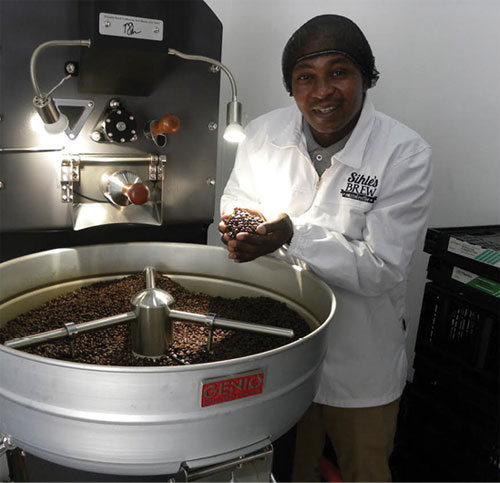
The range is sold at retail stores in five provinces and at his three Johannesburg-based Sihle’s Brew coffee shops.
Magubane says he chose to process his own coffee as it allows him control of the entire value chain and helps create more jobs. “I started out in 2012 by purchasing coffee that had already been processed and then repackaging it under my own brand. However, I wanted to create my own product and so I started processing raw coffee beans myself.
“Our coffee is made with the client in mind. This means we make the coffee based on the order we get from client, who is then guaranteed the freshest coffee on the market,” he says.
Magubane’s company owns its own processing and packaging machines, thanks to R421 000 in funding from the Small Enterprise Development Agency (Seda).
As an entrepreneur, Magubane hopes to play his part in helping South Africa recover from the economic impacts of COVID-19 by expanding his company’s footprint and creating more job opportunities. He recently struck a deal to supply coffee to one of the country’s top retailers, which will add to his 18-member staff complement.
“The deal will mean that we grow our production scale and hire more people. The more our productivity grows, the more we will be able to promote the people we already have in the company, whilst also recruiting more people,” he says.
Sihle’s Brew was not spared the impacts of COVID-19. The company had to shut its doors for months during the lockdown but was fortunately able to save jobs by making use of the Unemployment Insurance Fund’s Temporary Employer-Employee Relief Scheme, which paid the salaries of his employees.
He says the process went smoothly and the company was able to pay its employees from the first month of the lockdown.
Sihle’s Brew has been awarded International Organisation for Standardisation and South African Bureau of Standards certificates, which means customers can have confidence in its products and processes.
Community kitchen brings hope to Tholeni
Community kitchen brings hope to Tholeni UrsulaA rural community has turned its painful past into an opportunity to feed and grow its people, after being thrown into darkness by a serial killer. 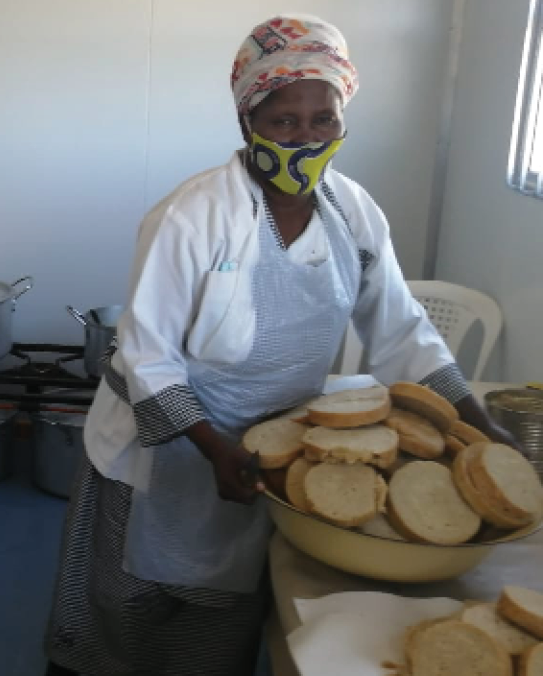
The Phumalanga Nutrition and Development Project, which operates from the Tholeni White Door Centre of Hope in Tholeni Village in the Eastern Cape, feeds 120 elderly people living with disabilities and orphaned children.
The centre was started as a community kitchen in 2013, after convicted serial killer Bulelani Mabhayi raped and killed over 20 women and children in the village.
A beneficiary of the Phumalanga Nutrition and Development Project, Notheko Mabayi (70), says the village’s women started the project due to the impact of poverty in the village. Community members donated R20 per household for food and equipment.
“The families in our community had lost breadwinners and children were left orphaned by the killings. After seeing the devastation, we decided to help those less fortunate by starting a food drive,” Mabayi says.
When the project was up and running, the Department of Social Development took over the funding of the project, supplying food, cutlery, tables and stoves.
Mabayi says the meals are also helping to curb crime among the youth, as they now have something to eat. “In the past, we had a serious issue of theft, but this has decreased since the programme started.”
The meals community members receive are nutritious, containing vegetables, starch and protein, and Mabayi is able to feed herself and her granddaughter. “Tonight, I will not have to cook supper. We will have enough food from the meal that I collect from the centre,” she says.
The non-governmental organisation’s deputy chairperson Witness Madondo says the kitchen aims to foster a united community that looks after each other. “The idea was to have a place where the elderly in our community can be looked after and be safe and productive.”
Madondo explains that the village’s elders also use the centre to participate in skills development and recreational activities, including playing soccer and participating in athletics competitions.
“Our athletics team represented our municipality at the provincial athletics tournament for the elderly in 2018,” says Mabayi.
Elder abuse is a crime
Elder abuse is a crime LondekileA busing the elderly is not only wrong, it is a punishable offence in terms of the Older Persons Act (2006).
As South Africa highlights the 16 Days of Activism for No Violence Against Women and Children from 25 November to 10 December, the elderly population should also not be forgotten.
According to Femada Shamam, the CEO of Tafta, elder abuse refers to a single or repeated act, or lack of appropriate action, which causes harm or distress to an older person, in any relationship where there is an expectation of trust.
A registered non-profit organisation, Tafta has specialised in the care of elders in eThekwini, KwaZulu-Natal, for six decades, offering various services to support elders to live a life of dignity, growth and meaning. Its services include prevention programmes, early intervention and continuous care.
Types of elder abuse
There are various forms of elder abuse, namely:
Physical: An act that results in injury or death, through the use of any physical means such as hitting, shaking, pushing, rough handling, cutting and slapping.
Financial: The illegal or improper use of an older person’s property or finances.
Sexual: An act that results in the exploitation of an older person for sexual or erotic gratification without knowledge, understanding and consent.
Psychological, emotional or verbal abuse: A pattern of degrading or humiliating conduct that results in impaired psychology and/or emotional functioning. These types of abuse may be intimidation, victimisation and a violation of human rights.
Protect our elders
“Elder Abuse takes many forms and at times may even be unintended or due to frustration that results from caregiver stress. This stress could be rooted in many of the informal family caregivers not knowing how to care for and support the elder and the stress of trying to balance the care of their loved one with other responsibilities,” explains Shamam.
She says there’s a belief held by various cultural groupings and communities that the aged are ‘abandoned’ in old age homes. “Organisations like Tafta provide elders with a place of safety and offer them an opportunity to find peace and solace in their sunset years, after years of abuse or disrespect. In some cases, an elder’s support system can’t manage the complexity of care required and intervention is needed.”
Community members can support elders by ensuring that they are not isolated. Have a friendly chat with them so that they know they are not alone.
Tafta’s social workers can intervene in difficult situations. For assistance, email intake@tafta.org.za, call 031 332 3721 or visit www.tafta.org.za.
Equipping youth with resilience
Equipping youth with resilience LondekileThe impact of the Coronavirus Disease (COVID-19) pandemic is increasing youth unemployment through job losses, affecting them and their dependents.
This is according to the Minister in the Presidency responsible for Women, Youth, and Persons with Disabilities, Maite Nkoana-Mashabane, who says that this and other challenges that the youth face have psychosocial effects and affect their well-being.
To deal with this challenge, the Department of Women, Youth, and Persons with Disabilities will soon launch the National Youth Resilience Initiative, which will be rolled out across the country.
The objectives of the initiative are to focus greater attention on the psychosocial well-being and resilience of young people during and in the aftermath of COVID-19, and to promote greater provision of and access to quality, evidence-based psychosocial support programmes and services, including life skills programmes, counselling, leadership development programmes, active citizenship and volunteering programmes.
“The programme will be driven by young people, with expert technical support on hand to assist them. It will be delivered primarily via social media, using creative branding and messaging that will appeal to them.
“Young people with high psychological well-being are less likely to engage in criminal activity or abuse drugs and alcohol. Positive psychological well-being tends to predict higher earnings and more prosocial behaviour, such as volunteering,” the Minister says.
She defines resilience as the process of bouncing back from difficult experiences like COVID-19, and says it can help protect people from various mental health conditions, such as depression and anxiety.
“The youth is undergoing severe socio-economic challenges. Therefore, it is of the utmost importance that we build their resilience to overcome these challenges they are facing,” the Minister says.
Reconstruction and Recovery Plan
The initiative also speaks to government’s Reconstruction and Recovery Plan, to help South Africa recover from the economic impact of COVID-19.
President Cyril Ramaphosa says it’s important to get people back into the jobs they lost during the pandemic and that government is determined to create more employment opportunities for those who were unemployed before the pandemic or who had given up looking for work.
Final push for matric 2020
Final push for matric 2020 SiboneloThe matric class of 2020 has started with their National Senior Certificate examinations. It is the culmination of 12 years of schooling and a gruelling final year of preparation. For many this is an exciting moment, but one that is also fraught with anxiety.
This year’s exam will be written under unprecedented conditions. We are in the midst of a global pandemic. The nationwide lockdown we had to impose in March to contain the spread of the coronavirus caused immense disruption to everyday life and cost valuable hours of learning and study.
To accommodate the disruptions the June Senior Certificate exams were postponed and will now be written together with the National Senior Certificate. More than a million candidates are expected to sit for the 2020 matric examination period which started recently.
This makes this combined examination the largest public exam ever administered in South Africa.
The provincial and national Departments of Basic Education are to be congratulated for their sterling preparation to ensure things proceed smoothly. These include the independent and public auditing of examination centres, finding extra venues to accommodate the large number of candidates, and the development of protocols to ensure compliance by candidates and officials with COVID-19 regulations.
The Class of 2020 has had to endure conditions their predecessors never had to confront. They had to adapt in real time not just to finish the curriculum but to catch up with the learning hours lost. Though some had access to online learning platforms and other resources, many had to struggle with access to learning material and teaching.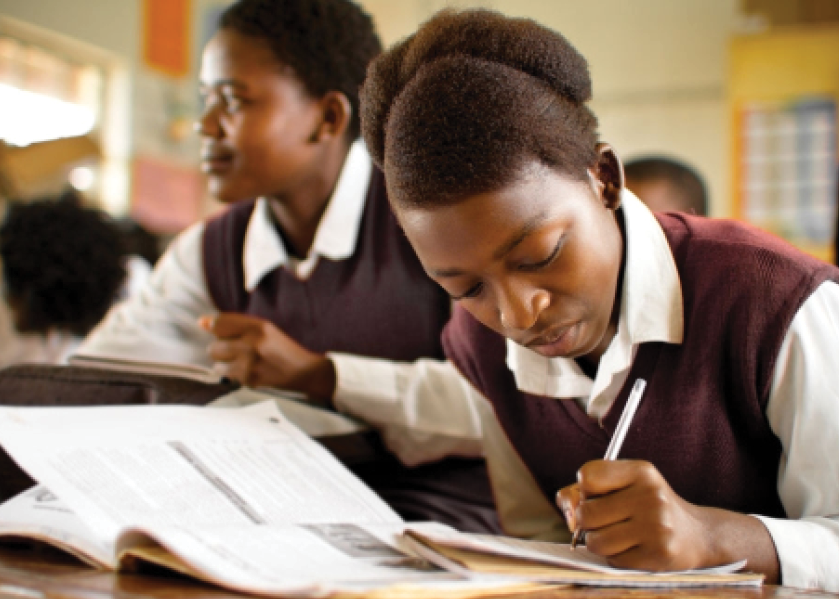
They had to endure the mental strain of social isolation, and for many months were cut off from friends and their teachers. They were not able to participate in sporting, recreational and leisure activities that are so essential to a well-rounded life and that relieve the stresses of prolonged study.
Yet, despite having the odds stacked against them, our learners are determined to present for this exam that is the pinnacle of their schooling.
It has been equally difficult for our educators. Despite the risk posed by the virus and resource challenges inside our schools, the majority of our teachers heeded the call to return to school to salvage what was left of the academic year.
They presented for work every day to support our matriculants. They put in the extra hours to get our learners over the finish line, making the most of the resources they had to ensure learning continued.
I salute our educators who have been there for their students when they were needed most. They have given so much, personally and professionally. They put our learners first and in doing so affirmed once more that our teachers are among our finest public servants.
This pandemic has brought our nation together in ways not experienced before, and this was demonstrated in the matriculation examination preparations.
Many businesses played a supportive role, assisting with the provision of technology like tablets to schools and assisting to resource school multimedia centres. Mobile network operators established e-school platforms during the lockdown carrying free learning content, including subject content for matriculants.
University graduates set up tutoring platforms online, making much needed supplementary learning support available for free.
The SABC and other TV providers have carried catch-up lessons for matric learners through the Department of Basic Education’s Woza Matrics Programme, enabling learners to prepare for the examinations.
There is the heart-warming story of Dendron Secondary School in Limpopo, where a group of dedicated teachers opened their own homes to their students. During the early days of the lockdown, they provided food and accommodation to small groups of matriculants, and supervised their studies.
There are no doubt many such stories in other parts of our country; of educators convening home-study groups with their students and of parents providing food, learning space and other resources to their children’s friends.
Without the support of parents, families and communities, our young people’s path to the matric exam would have been considerably harder. We thank them for their support.
Despite all the challenges this year has brought, I call on the Class of 2020 to summon their great reserves of courage and strength in this, the final push.
To the Class of 2020, I wish you the very best.
You have overcome difficulties that would test the resolve of even the most experienced and hardened adults.
At your tender age, there are so many demands upon you. There are the pressures of rigorous study, the pressure to excel and to achieve the results you need to study further. And yet you have come this far.
When you enter the exam room in the days ahead, you will be carrying not just your own hopes for success and those of your families. You will also carry the hopes of us, the South African people.
We are immensely proud of you and wish you the very best of luck.
Help for GBV victims in the Free State
Help for GBV victims in the Free State SiboneloThe Free State Department of Health has designated 32 health facilities and assigned trained medical officials and forensic nurses to meet the needs of victims and survivors of gender-based violence (GBV).
Four of the facilities are Thuthuzela Care Centres, which were established by the Department of Social Development (DSD) in partnership with the National Prosecuting Authority.
This is according to the manager of clinical services at the regional health department, Priscilla Monyobo, who is also a forensic nurse and president of the South African Forensic Nursing Association.
“About 80% of GBV victims who access our services are transported by members of the South African Police Service and about 20% walk into our facilities to ask for help,” she explains.
Monyobo says the facilities are led by the DSD, which is mainly responsible for coordinating all stakeholder plans on GBV interventions. This means that her department works in collaboration with the DSD and other stakeholders to convene joint plans and programmes that assist GBV victims.
“Various departments and stakeholders have specific mandates on GBV. For example, the Department of Justice leads programmes and activities that seek to address the challenge of human trafficking. If it has unscheduled activities on human trafficking, the health and social development departments will be informed to render clinical, psychosocial and shelter services as per the Trafficking in Persons Act,” she explains.
One of the GBV support facilities in the province, Tshepong Thuthuzela Care Centre based at Bloemfontein’s National District Hospital, provides services to victims and survivors of rape, sexual violence and physical assault, among others.
The centre operates from 7am to 7pm throughout the week and offers counselling and psychosocial support.
The spokesperson for the provincial health department, Mondli Mvambi, says these services are replicated in all five districts of the province to ensure that victims and survivors of abuse can get help close to their homes.
Helping GBV victims who have a hearing disability
Helping GBV victims who have a hearing disability UrsulaThe inclusion and representation of people who live with disabilities is important when rendering government services because all citizens must be treated fairly and with the respect they deserve. 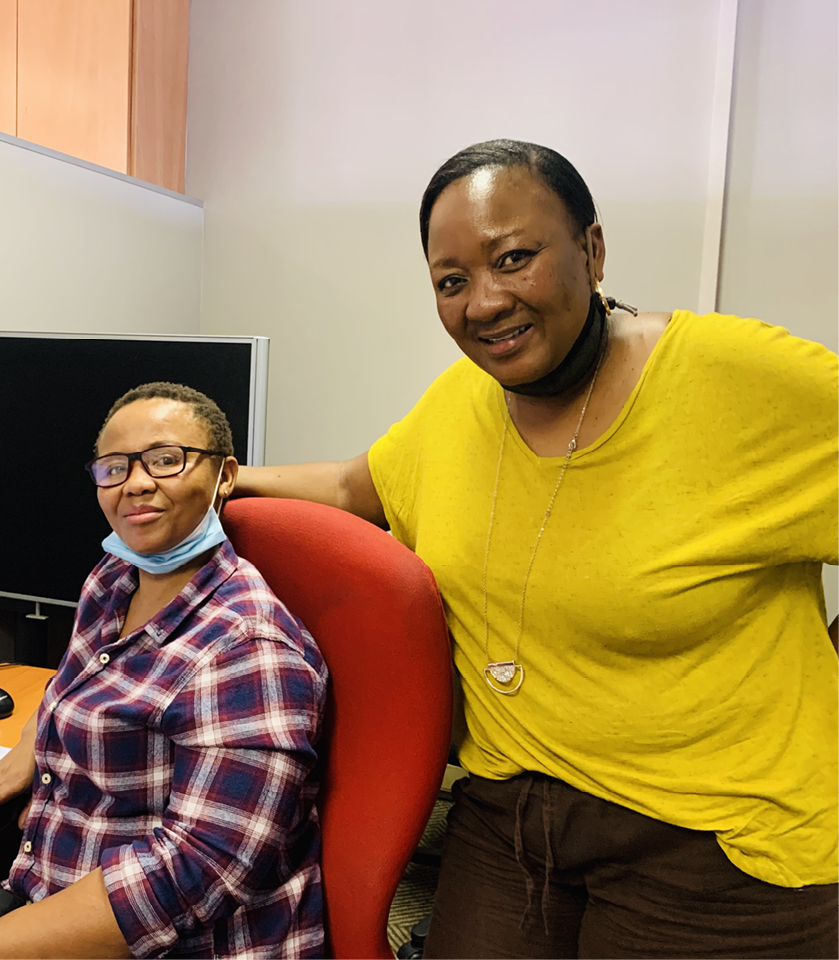
This is why the Gender-Based Violence Command Centre (GBVCC) has an SMS line and Helpme GBV contact facility on Skype to provide information and psychosocial support to victims of GBV who are hard of hearing and those who are deaf.
The GBVCC is a 24-hour call centre dedicated to providing support and counselling to people affected by GBV.
Sindiswa Jojozi (45) is a social auxiliary worker at the GBVCC. As a deaf person herself, Jojozi’s job entails giving useful information to clients who are deaf or hard of hearing through SMS and Skype.
She says the centre does not only get calls from GBV victims but also from their family members and friends, who phone on their behalf.
“If the victim needs to be referred to a social worker, I am responsible for facilitating the process for them,” she says.
She is also responsible for summarising the deaf victims’ cases and writing reports.
Qualified social worker Barata Molopyane (42) is the only colleague Jojozi has who is able to communicate in South African Sign Language.
As a social auxiliary worker, it is Jojozi’s job to support Molopyane’s work, which is providing counselling and psychosocial support to victims and survivors. The pair started working together at the centre in 2016.
How does Helpme GBV work?
Explaining how the Skype service (Helpme GBV) works, Molopyane says a client contacts the centre and Jojozi accepts the request so that they can start communicating.
“A client has an option to either use a video or text to communicate. As soon as we have captured the client’s information, we open a ticket, which is basically a file that stores the client’s information and has a unique reference number,” she says.
The social worker further links the victim with the nearest police station. However, Molopyane says most victims who are deaf experience language barriers.
“From the police station to the court, sometimes the information that can help the victim is there but it becomes difficult for officials to communicate it clearly because of the language barrier. This often leads to the victim feeling failed. In order to deal with that, social workers who have the skill to use sign language end up having to revisit the case with the law enforcement officers so that the victim can be helped,” she says.
Molopyane says this is because getting a sign language interpreter is a process and they are not always available, so a lot of cases remain pending.
For this reason, Molopyane was amongst those who signed a petition for South African Sign Language to be considered as the 12th official language.
Molopyane says one of the challenges that the centre faces is that not everyone who is deaf has access to Skype.
“The GBVCC is looking into expanding resources, such as establishing a WhatsApp line,” she says.
The centre also conducts awareness campaigns in schools, communities and through the media to reach out to more people who are deaf so that they can be aware of the services available.
Signs of abuse
According to Molopyane and Jojozi, people living with a hearing disability show the same signs of abuse as anyone else – they become angry and withdraw from their social life.
“Most of the signs are similar to those of anyone else, including people who can hear,” says Molopyane, urging parents and members of the community to look out for signs of abuse.
“Deaf people normally rely on their social clubs because that is where they feel safe and comfortable to share their frustrations and problems,” adds Jojozi.
They say schools for the deaf are also resourceful in helping young children who may be victims of abuse, because the schools have social workers and psychologists that teachers may refer children to.
Molopyane and Jojozi encourage deaf people not to be scared to speak out against abuse and to tell someone they trust.
GBVCC contact details:
- Emergency line:
- 0800 428 428
- Please call me:
- *120* 7867# (supported by a USSD)
- Skype: Helpme GBV (for members of the deaf community)
- SMS: ‘help’ to 31531 (for persons with disability).
How to get chronic pain to back off
How to get chronic pain to back off LondekileThe challenges of the Coronavirus (COVID-19) pandemic and lockdown restrictions have led to a lack of physical activity that has made people more at risk of spine pain and disability.
With Disability Rights Awareness Month celebrated in South Africa from 3 November to 3 December, Vuk’uzenzele highlights the importance of taking care of your back.
Almost everyone has lower back pain at some point in their lives. The lower back, which starts below the ribcage, is called the lumbar region. Pain in this area can be intense and is one of the top causes of missed work.
Fortunately, lower back pain often gets better on its own. When it doesn’t, there are effective treatments, such as staying active and taking painkillers. However, some people will need medical treatment, such as manual therapy, massage, mobilisation or spinal manipulation.
Back pain symptoms
Back pain can have various symptoms, including:
- A dull aching sensation in the lower back.
- A stabbing or shooting pain that can travel to the leg and foot.
- Not being able to stand up straight without pain.
- A decreased range of motion and less ability to flex the back.
The symptoms of back pain, if due to strain or misuse, are usually short-lived, but can last for days or weeks. Back pain is chronic when symptoms have been present for longer than three months. It’s then advisable to see a doctor or visit your closest clinic.
Tips to ease the pain
Lifestyle changes can help you to manage and prevent lower back pain. Having a healthy lifestyle may make you less likely to suffer an accidental injury too.
The six tips below can help ease back pain and prevent back pain in the first place.
- Exercise: Regular exercise helps build strength and control body weight.
- Diet: Make sure your diet includes enough calcium and vitamin D, as these are needed for bone health. A healthy diet also helps to control body weight.
- Lift heavy objects the right way: Be sure to squat when lifting heavy objects, so that your hips and knees do most of the work. Keep the load close to your chest when you lift.
- Bed: You should have a mattress that keeps your spine straight and supports the weight of your shoulders and butt.
- Stretch often: Doing the same thing every day can tire your muscles, which makes them easier to strain. Stretch regularly to help improve circulation in those muscles and lower the risk of back pain and damage.
- Improve your posture: Poor posture can put unnecessary pressure and strain on your spine. Over time, this can lead to pain and damage. A good chair for working should have good back support, arm rests and a swivel base.
It’s never too late to get your matric
It’s never too late to get your matric tsoanaGenerations of people who were unable to finish high school because of personal challenges, are still able to get that much-desired matric certificate.
When Frans Mpete was 15 years old, hard times forced him to leave school. Fast forward 50 years and Mpete, now 65, is close to ending his years-long regret of not having matriculated.
The resident of Lombardy East in Johannesburg says he always felt he was missing out because ‘without matric you are less able to earn a good income’.
“If you lack skills, your chances of being employed are limited,” he says.
A keen newspaper reader, Frans had read many articles over the years about people obtaining a qualification despite all odds and decided if they could do it, so could he.
In 2018, he registered with the Gauteng Community Education and Training College and completed Grade 11, attending classes part-time at Realogile High School in Alexandra. He now has two subjects left to write before obtaining his senior certificate.
“Unfortunately, the Coronavirus (COVID-19) has delayed my studies and I think I will only complete the course next year,” Mpete says.
Because he does not have access to a computer, Frans has found the work very challenging but remains determined to succeed.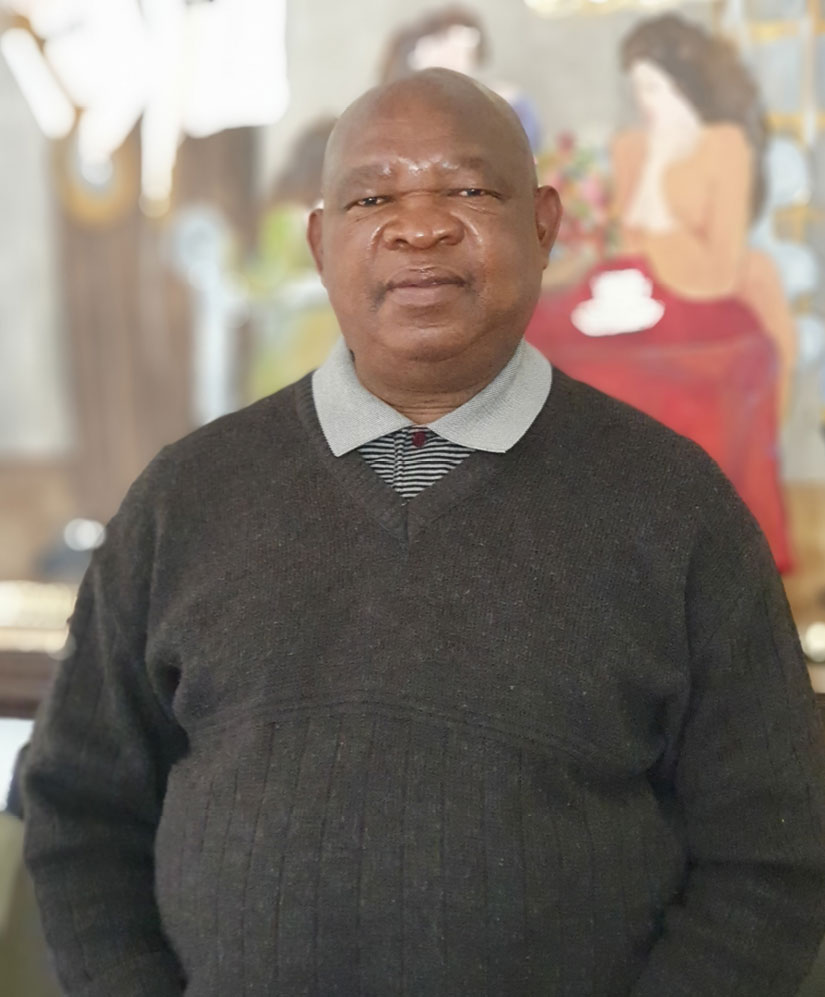
After helping his family at home for a number of years, Frans found a job as a gardener at Rand Aid Association in Edenvale in 1975, when he was 20. Forty-five years later, he is still with the organisation – today as a head office driver.
Born in Brits and raised in Rustenburg, Frans had a rural upbringing and looked after his grandfather’s cattle.
In 1988, he married Thandi and the couple had two children, daughter Dimakatso and son Kgotso.
Retirement from Rand Aid is on Frans’s horizon but he is still determined to get a matric certificate.
Frans has the following words of advice for youngsters writing matric. “Pay now and play later,” he says. “Put in as much hard work as you can as you write your final exams and you will reap long-term benefits. Having a matric certificate will open up many opportunities for you.”
Older adults can still get their matric!
Government’s Amended Senior Certificate (ASC) – also called Adult Matric – enables people who were unable to finish high school to get their matric, no matter what their age.
The following learners will qualify for admission to the ASC:
Adult learners who are 21 years and older who have a General Education and Training Certificate (GETC); a Grade Nine school report (or the old Standard Seven), stating that they have passed Grade Nine or Standard Seven; or a recognised equivalent qualification obtained at NQF Level l, which requires two official languages.
Adult learners who are 21 years and older with an incomplete Senior Certificate qualification.
Adult learners who are 21 years and older with an incomplete National Senior Certificate and whose School-based Assessment (SBA) validity has expired.
In exceptional cases, out-of-school youth who are between 18 and 21 years old and who could not complete their school education due to circumstances beyond their control, may be accepted.
To pass the ASC, a candidate must select six subjects. Studies are done part-time or online.
The Amended Senior Certificate academic year is from August to June and not January to December, like ordinary matric.
To register, visit any provincial education office (which includes the provincial head office, the district office or a circuit office) or register online at www.eservices.gov.za.
For further information and provincial contact details, visit www.education.gov.za/Curriculum/SeniorCertificate.aspx or call the DBE’s call centre at 0800 202 933.
LGBTI rights are protected
LGBTI rights are protected UrsulaEvery South African has a right to live in a society where they feel safe and protected. This includes people in the Lesbian, Gay, Bisexual, Transgender, and Intersex (LGBTI) community.
 Some people who fall within the LGBTI community have in the past been victims of violence due to their gender choice.
Some people who fall within the LGBTI community have in the past been victims of violence due to their gender choice.
The spate of crimes that were targeted at the LGBTI community has led to the establishment of several legal organisations and non-governmental bodies aimed at protecting the rights of LGBTI people.
One of the institutions established to protect and enforce the rights of the LGBTI community is the National Task Team on Gender and Sexual Orientation-Based Sexual Violence Perpetrated Against LGBTI Persons (NTT).
The NTT is a body formed by the Department of Justice and Constitutional Development (DoJCD) working with the South African Commission for Gender Equality; as well as LGBTI rights groups such as Gay & Lesbian Memory in Action (GALA); OUT LGBT Well-Being (OUT); the Foundation for Human Rights (FHR) and other role players.
As part of its work the NTT, through the national Rapid Response Team (RRT), records, monitors and fast tracks hate crime cases within the criminal justice system. The RRT is made up of the DoJCD, NPA, South African Police Service and representatives as well as representatives of civil society organisations.
The purpose of the RRT is to attend to the pending and reported cases in the criminal justice system, where hate crimes have been committed against LGBTI persons.
This is done to ensure that reported and pending cases of hate crimes are attended to and finalised within a reasonable time. The RRT also collects information on reported hate crime cases. This set of information includes the full names of the victim, the full details of the perpetrator, the date on which the crime was committed as well as when and where it was reported.
The court and case number, brief facts of the offence, status of the case, outcome of the case and information on sentencing in cases of convictions also form part of the information that is available from the RRT.
This information was supplied by the Department of Justice and Constitutional Development.
For more information on the RRT www.nationallgbtitaskteam.co.za. Provincial office information is also available on the website. Alternatively, call the DoJCD at 012 357 8107 for help on all matters related to LGBTI and justice.
Mass job creation projects explained
Mass job creation projects explained UrsulaGovernment has unpacked the mass employment programme and infrastructure development projects that form part of the Economic Reconstruction and Recovery Plan. 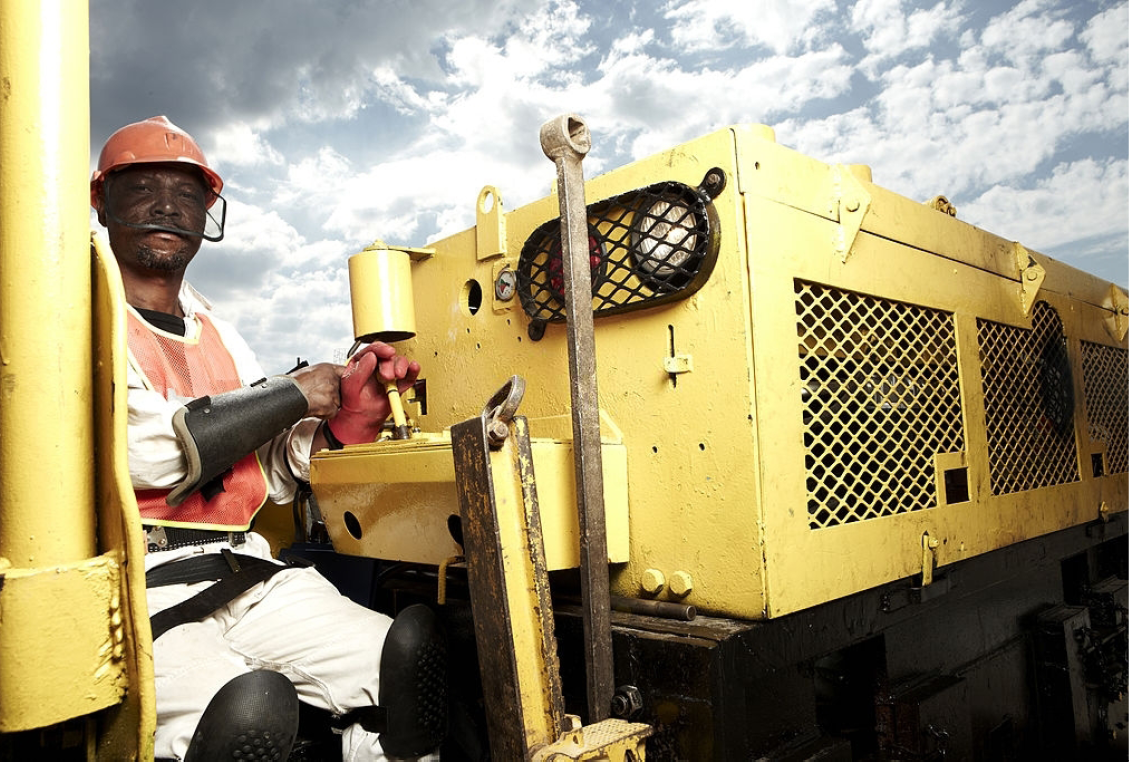
Leading up to the recovery plan was Cabinet’s approval of the Infrastructure Investment Plan (IIP), which is a new way of project planning, preparation and packaging infrastructure projects, says Patricia de Lille, the Minister of Public Works and Infrastructure.
The first phase of the IIP includes projects from all three spheres of government, state-owned enterprises and the private sector.
Fifty infrastructure projects are ready for investment and implementation and 12 special projects, of which five have an additional focus of mass employment, were identified in the plan. All 62 were gazetted as Strategic Integrated Projects (SIPs) in July.
The gazetting enables projects to be prioritised and regulatory processes and implementation to be fast tracked.
“All 62 SIPs are at various stages and will result in major job creation and stimulation of the economy over several financial years,” says Minister De Lille.
Infrastructure South Africa (ISA) will drive the IIP’s implementation, assisting with blockages, unlocking funding and monitoring implementation; while the Infrastructure Fund will provide capacity to prepare and package projects. Government has committed R100 billion over 10 years to the Infrastructure Fund.
What is new, De Lille says, is that the projects are assessed in terms of how they advance the national development goals, including the National Development Plan and key priorities of the AU Agenda 2063.
Mass employment programmes
Four mass infrastructure-led public employment programmes have been gazetted.
The Comprehensive Urban Management Programme will employ and sustain 52 000 jobs over the next three years, while providing training and skills development. It will start in the Vhembe District Municipality, OR Tambo District Municipality and eThekwini Metropolitan Municipality.
The Rural Bridges Welisizwe Programme will ensure the installation of bridges over rivers, to enable people to cross them safely. By March 2021, 14 bridges will be installed, and 170 will be installed in the following 12 months. In total, 400 bridges will be installed in three years.
The Digitisation of the Government Information Programme will create employment opportunities for 10 000 unemployed youth graduates to digitise paper-based government records.
The Rural Roads Rehabilitation and Upgrading Special Programme will create over 4 000 jobs in the construction of rural roads. The 200km of roads initially identified are in the rural areas of the Eastern Cape, North West, Limpopo, Free State and KwaZulu-Natal.
“In all of these programmes, we will ensure that recruitment is fair, open and transparent, and that opportunities are advertised widely,” says De Lille. 
Project updates
The SIP Steering Committee is fast-tracking the implementation of the 62 projects.
The gazetting of the projects enables the ISA and steering committee to speed up the process and reach concrete solutions for the projects’ next phases.
“This will result in major job creation and the development of much-needed human settlements across the country,” says De Lille.
The SIPs currently under construction that require funding solutions are:
Lufhereng, in Johannesburg, Gauteng: The development is envisaged to deliver over 24 000 housing opportunities and create over 7000 jobs.
Mooikloof and Green Creek, in Tshwane, Gauteng: These projects are estimated to yield 60 000 jobs.
Greater Cornubia, in eThekwini, KwaZulu-Natal: The development is expected to deliver over 57 000 housing opportunities and 64 000 jobs.
Vista Park I and II, in Mangaung, Free State: This project is expected to yield 33 300 units and 5 500 jobs.
“In total, 18 housing projects have been gazetted as SIPs, valued at R129 billion, which will produce over 190 000 housing units,” says De Lille.
Occupational therapy vital for recovery
Occupational therapy vital for recovery UrsulaWith Disability Rights Awareness Month celebrated in South Africa from 3 November to 3 December, Vuk’uzenzele sheds some light on occupational therapy (OT), which enables people across all ages to live life to its fullest despite illness, injury or disability. 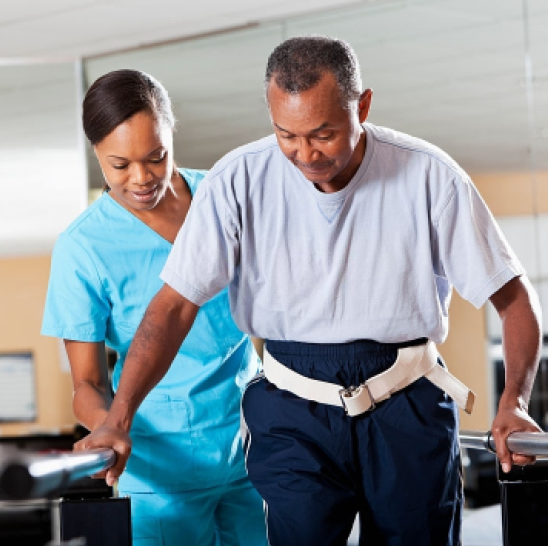
OT helps people with health challenges to better participate in daily life and plays a vital role in the treatment and recovery of various medical conditions and severe trauma, such as burns or car accidents.
“OT is the art and science used to develop, recover and maintain the meaningful activities or occupations of individuals, groups or communities,” says Leanne Windsor, the Assistant Director of OT at Pelonomi Tertiary Hospital in the Free State.
She explains that occupational therapists assess impairments and address them using various forms of treatment.
“Each area of OT uses specific activities during therapy and treatment, and activities are chosen depending on the person, their diagnosis and treatment and their occupations. These are categorised as activities of daily living, instrumental activities of daily living, health management, rest and sleep, education, work, play, leisure and social participation.”
How often a person should have OT sessions is also dependent on their diagnosis and the treatment required.
“When a person is admitted to hospital following an accident, for example, they will begin with daily rehabilitation during admission. During this time, they will be assessed by a multi-disciplinary team, including the OT.
“If the person has a permanent disability, they are assessed and appropriate assistive devices are issued and education done with the person and their family. Prior to discharge, assistance is provided to the person and their family with home adaptations that may be required, however only people who have permanent disabilities qualify for a wheelchair. Training on the person’s care and their possible return to work, if applicable, is also conducted. The person will then continue with out-patient therapy, weekly or when they are able to attend,” says Windsor.
Many public clinics have community service OTs or OT technicians. If no therapist is available, a person is able to attend therapy at the nearest hospital or clinic that is able to provide OT services.
Plan to have GBV one-stop centres in hotspots
Plan to have GBV one-stop centres in hotspots SiboneloPresident Cyril Ramaphosa says government is working towards ensuring that there is a model, gender-based violence one-stop centre in all areas that have been identified as hotspots.
The President said this when he responded to oral questions from Members of Parliament in the National Council of Provinces recently. “We are focused on efforts to ensure that there is a model GBV one-stop centre in each of the identified 30 hotspot areas. These centres provide multidisciplinary services such psychological and health support.
“They also provide investigation and prosecution but more than that, they also are becoming places of assistance at an economic level for women and help with housing problems as well,” he says.
The Department of Public Works and Infrastructure has allocated several properties around the country for use as shelters of safety for victims of gender-based violence.
There are four in Tshwane, six in the Western Cape and two in Johannesburg.
Additional properties are being assessed in other areas, the President says.
“We are therefore working to expand the Khuseleka one-stop centres in the first phase in Cape Town, Sol Plaatjie Municipality, eThekwini, Mangaung, Ehlanzeni, Tshwane and Johannesburg.
“In the second phase, we will identify buildings in the Eastern Cape, North West and Limpopo to enhance the existing Khuseleka shelters.”
The Khuseleka One-Stop Centres, which will be open 24-hours a day, provide services such as trauma counselling and psychological support, healthcare, police services, legal assistance and shelter for victims of abuse. The name ''Khuseleka'' is derived from the Zulu word which means protection.
The President says as the safe shelters are being expanded, government has developed the Victim Support Services Bill to enhance legislation to focus on victims of crime and violence.
The draft Bill has gone out for public comment and the Department of Social Development is consolidating the inputs received from the public.
“The Bill is victims-centred and touches on the importance of state-owned properties and the accreditation of providers of sheltering services. This in many ways will ensure that service providers are qualified to provide professional services to survivors," he
says. SAnews.gov.za
Potato farmer ploughs ahead
Potato farmer ploughs ahead tsoanaA 28-year-old Eastern Cape man is ploughing ahead on his mission to become a top potato farmer, thanks to a partnership with Potatoes South Africa.
Yonela Ndzoboyi from Ludeke Village in Bizana owns Lencolin Green Project, which has successfully harvested 2 000, 10kg bags of potatoes, grown on a five-hectare farm.
“I started this initiative by saving part of the stipend I received when I was doing my in-service training. I was offered a job to manage a farm in Pretoria but I chose to start my own business, instead of making someone else a millionaire,” he says.
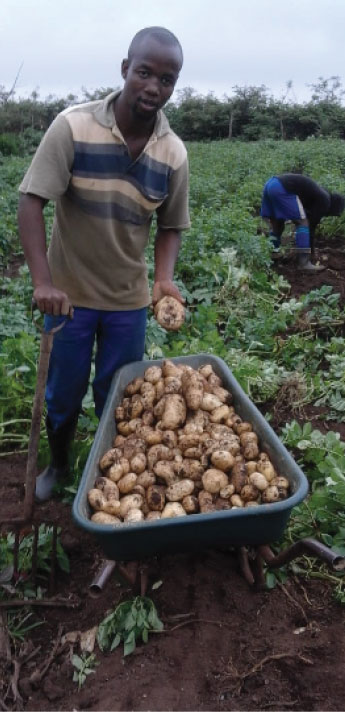 Ndzoboyi, an agriculture management graduate from the University of South Africa, says Potatoes SA offered its support after receiving a business plan from him. He was told to contact the Eastern Cape Department of Rural Development and Agrarian Reform (DRDAR), which facilitated the partnership with Potatoes SA.
Ndzoboyi, an agriculture management graduate from the University of South Africa, says Potatoes SA offered its support after receiving a business plan from him. He was told to contact the Eastern Cape Department of Rural Development and Agrarian Reform (DRDAR), which facilitated the partnership with Potatoes SA.
Working through extension officers from DRDAR and Potatoes SA, Ndzoboyi’s potato harvest was so successful that he has decided to plant potatoes on another three hectares.
Through Potatoes SA’s incubator programme, he has access to seeds, pesticides and herbicides. Potatoes SA also guided Ndzoboyi as to which type of potato to plant, after inspecting the soil on the farm.
“The consultants from Potatoes SA assisted me throughout the farming season. They came to the farm and offered technical support as well as advice on what the next step should be. Their help ensured that I produced a good harvest that I was able to sell to one of the country’s big retail shops, Boxer Superstores, as well as local businesses and community members,” he says.
Spinach, cabbage and butternut are also grown on the farm, which has five full-time employees.
Ndzoboyi believes that other young farmers can achieve the success he is enjoying by doing proper research, being willing to share ideas and learning about good agricultural practices.
Emerging farmers wanting to receive similar assistance, should contact DRDAR’s extension services can call 043 602 5006/7 or visit the website www.drdar.gov.za. Potatoes SA can be contacted at 012 349 1906 or by visiting www.potatoes.co.za
Prevent diseases by washing your hands
Prevent diseases by washing your hands LondekileThere’s no doubt that the Coronavirus (COVID-19) pandemic has brought home the message that frequent handwashing is one of the best ways to avoid getting sick and spreading illness.
Bacteria, viruses and germs are everywhere. While some are good, many are harmful and can cause infections and diseases.
As you touch people, surfaces and objects throughout the day, you accumulate germs on your hands. You can infect yourself with these germs by touching your eyes, nose or mouth, or spread them to others. Although it's impossible to keep your hands germ-free, washing your hands often can help limit the transfer of bacteria and viruses.
With COVID-19 cases starting to rise again, it’s very important to keep washing your hands regularly and practise good hand hygiene.
How germs are spread
Many people spread germs to other people via their hands, without even knowing it. Germs can also be spread by:
- Touching your eyes, nose and mouth with unwashed hands.
- Preparing food with unwashed hands. The germs spread into the food and can grow in the food.
- Germs from unwashed hands can spread to objects that we touch, such as cellphones, computers, door handles and keys.
Wash your hands
You can break the cycle of disease and keep yourself and your loved ones healthy by washing your hands often, especially:
- After using the toilet.
- Before, during and after preparing and eating food.
- After handling rubbish.
- Before feeding children or other people.
- Before and after changing a baby’s nappy.
- After touching animals.
- Before and after treating a wound.
- After blowing your nose, coughing or sneezing.
Information supplied by the KwaZulu-Natal Department of Health.
How to wash your hands
It’s very important to wash your hands properly. You can do this by following these steps:
- Wet your hands thoroughly with clean water and lather with soap.
- Rub your palms together to scrub.
- Rub between your fingers.
- Rub the back of your hands.
- Clean underneath your nails.
- Wash your wrists.
- Rinse thoroughly with clean water and then dry your hands with a clean paper towel. Drying your hands properly is also important, as wet and moist hands are more easily contaminated.
Information supplied by the KwaZulu-Natal Department of Health.
Proper eye care is vital
Proper eye care is vital SiboneloGood visual function has a direct positive impact on our ability to perform daily activities and contribute to society and the economy.
“It also affects children's ability to learn and grow at school and our fundamental ability to look after ourselves in general,” says Doctor Pauline Lam, an ophthalmologist which is a specialist eye doctor at the Eerste River Hospital eye clinic at the Western Cape Department of Health.
In general, an optometrist is a good first choice for people with visual complaints, as they may have a refractive error such as myopia (short-sightedness) that may require glasses, says Dr Lam. She explains that the optometrist will perform some tests, including a test for refraction and issue a pair of glasses for the patient, if needed.
“Optometrists also perform screening tests for patients with glaucoma, age-related macular degeneration and diabetes mellitus, which is especially associated with a high incidence of eye disease.”
How often a person should visit an optometrist depends on the nature of their condition, but usually once a year if they just have a refractive error. If the optometrist finds any problems, they will refer the patient to an ophthalmologist.
Avoid eye damage
To avoid eye damage from the sun it’s important to wear sunglasses, with special UVAB protection, or polarised sunglasses before spending hours outdoors. A hat or a cap can also shield the eyes from direct sunlight.
The claim that the use of device screens can damage the eyes has not been substantiated, says Dr Lam. “We know that constantly staring at a computer or smartphone screen can cause digital eye strain, an intermittent discomfort, blurriness and burning sensation and dryness in the eyes.”
If this happens, try to limit its use. Take breaks every 20 to 30 minutes and focus on something far away.
Common eye problems
In addition to trauma-related eye injuries, some of the common eye problems include refractive errors (short-sightedness and long-sightedness, astigmatism), dry eyes and allergic eye diseases.
“Common treatable, but irreversible, eye problems include glaucoma (open angle and closed angle), advanced diabetic eye disease and late age-related macular degeneration (wet form),” says Dr Lam.
“Unfortunately, with glaucoma (open angle) and early diabetic retinopathy, patients are frequently unaware that they have the condition as in the early stages the vision is not affected and there is no pain. That’s why it’s important for diabetic patients and those with a family history of glaucoma to visit an optometrist for regular screening,” says Dr Lam
South Africa’s economic recovery plan gets going
South Africa’s economic recovery plan gets going SiboneloA car parts manufacturing company that is owned by a black woman is on the road to success, despite only starting operations less than two years ago. 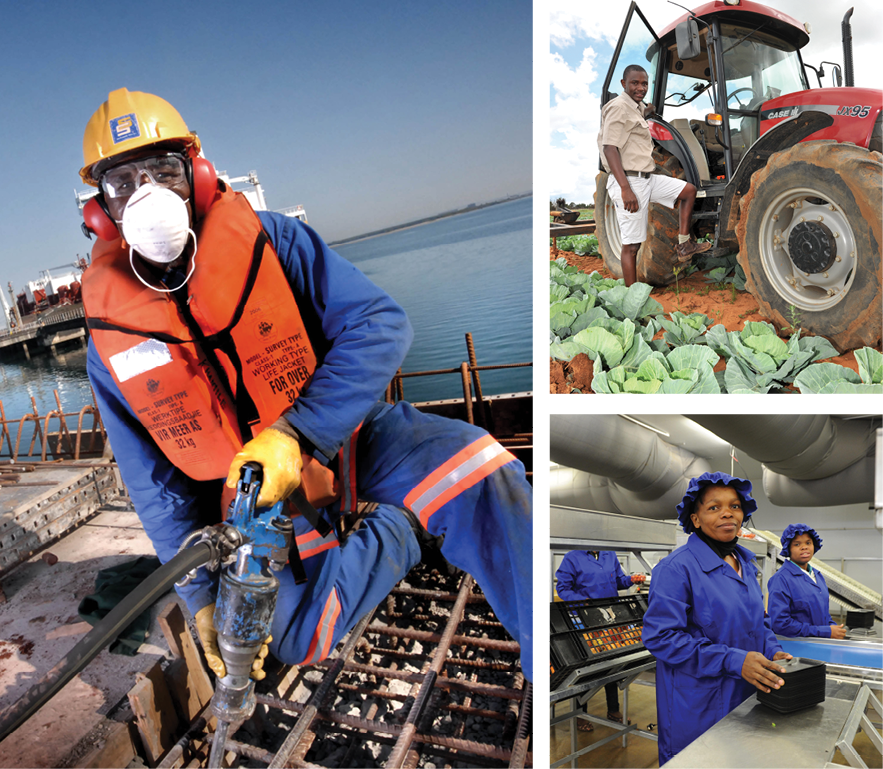
Aphelele Plastics makes car suspension bushings and washers – which are supplied to companies that deal in Volkswagens, BMWs and Audis; trolley tyres and newspaper cutting sticks.
Owner Nobuhle Gwala (53) says they make the products from polyurethane plastic material. “The polyurethane bushings and balls are used in a car’s gearbox and for the mounting of a car’s engine.
“We also make rubber newspaper cutting sticks, which are used by newspaper printing companies to separate the different newspapers as they come off the conveyor belt,” she says.
Aphelele Plastics, which was started in February 2019, currently produces around 100 bushings a day but that is set to double as Gwala’s company has received specialist manufacturing machinery and a bakkie through a government empowerment programme.
Speaking at the launch of KwaZulu-Natal’s Department of Economic Development, Tourism and Environmental Affairs’ (DEDTEA) Operation Vula Fund, MEC Nomusa Dube-Ncube said: “We are handing over bakkies, bakery equipment, catering equipment, animal feed and other machinery to 12 emerging entrepreneurs. I felt it was prudent that we hand over the equipment to the beneficiaries in order to speed up economic recovery.”
She said Operation Vula is supporting:
- 15 SMMEs that manufacture toilet paper are also being assisted;
- 15 township and rural bakeries have been allocated R11.7 million;
- five small enterprises that manufacture detergents and chemical cleaning products will receive R5.4 million and small businesses that fall in other sectors of the economy will share R18.3 million.
For Gwala, the bakkie and machinery provide an opportunity to better her business’s service offering.
“The clients we serve have offices in Pietermaritzburg, Durban and Pinetown. In the past, some of our deliveries would be delayed because the delivery service we were using was not available but now we will be able to deliver to clients as soon as we finish manufacturing our products,” she says.
The new machinery will improve the company’s production and this is turn will increase the number of people it employs in the next few months.
MEC Dube-Ncube says entrepreneurs like Gwala must make use of state funding programmes. “Job losses as a result of the Coronavirus disease (COVID-19) have resulted in spiralling levels of poverty. Many people have been retrenched and condemned to rural villages and peri-urban informal settlements with no means of survival .”
She said Operation Vula would reach all corners of the province, giving people the opportunity to produce local products and services for domestic use and exports.
“Critically, we reiterate our position that the lockdown regulations, which resulted in the disruption of the global value chain, have presented indigenous people with the opportunity to be self-sufficient and produce their own goods,” she said.
Economic reconstruction and recovery plan
Operation Vula is part of government’s Economic reconstruction and recovery plan.
The plan, recently announced by President Cyril Ramaphosa in a joint sitting of the National Council of Provinces and the National Assembly, aims to recover the two million jobs lost during the worst of the COVID-19 lockdown, as well as create jobs for those who were already unemployed. In the short-term, the plan aims to create over 800 000 jobs.
When announcing details of the plan, President Ramaphosa said: “We are determined to create more employment opportunities for those who were unemployed before the pandemic or who had given up looking for work.
“This means unleashing the potential of our economy by, among others, implementing necessary reforms, removing regulatory barriers that increase costs and create inefficiencies in the economy, securing our energy supply and freeing up digital infrastructure.”
Through programmes like the Operation Vula Fund, the State will support SMMEs in the manufacturing value chain.
“There are between 2.4 million and 3.5 million SMMEs in the country, with the largest number in the informal and micro sectors. They offer the greatest untapped potential for growth, employment and fundamental economic transformation,” President Ramaphosa says.
For more information about the Operation Vula Fund logon to www.operationvula.gov.za or call 0800 333 667.
Support for students with disabilities
Support for students with disabilities UrsulaThe Department of Higher Education and Training’s Strategic Policy Framework on Disability for the Post-School Education and Training System (PSET) promotes the creation of an inclusive and enabling environment for people with disabilities.
The policy framework was published in 2018 and provides the department with a monitoring and evaluation instrument to assess the mainstreaming of disability support in all PSET institutions.
Spokesperson Ishmael Mnisi says the department has the responsibility to ensure that all people, inclusive of people with disabilities, have access to and succeed within the PSET system, which includes technical and vocational education and training (TVET) colleges.
The department provides holistic student-centred support services at all 50 TVET colleges, which helps increase students’ chances of success and employability. It does this by assisting students in making programme and subject choices, enabling students’ access to financial aid, addressing the accommodation of students with disabilities and providing academic, emotional and social support.
Mnisi adds that the department promotes student health and wellness in TVET colleges, including disability and gender-based violence programmes that are provided through Higher Health Student Support Services units.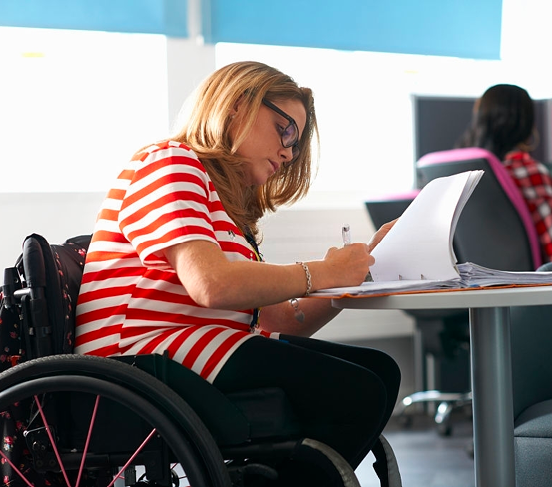
In 2019, the TVET branch within the department embarked on a series of capacity-building workshops to identify challenges in the provision of support services to students with disabilities. The underlying causes were analysed, best practice was shared and mechanisms to resolve these challenges were collectively formulated.
Identified challenges included the lack of guidelines or standard operating procedures, lack of suitable infrastructure, inadequate resources (financial and human) and lack of support from management, lecturers and students.
Mnisi says the department is currently conducting an audit of the state of disability mainstreaming in TVET colleges, which will enable it to address any shortcomings.
Owam Booysen (22) of Bedfordview is one of the students to benefit from the department’s support programmes for students who live with disabilities. He has an intellectual disability that requires him to process information faster and to speak out his thought process.
“I attended Tshwane North TVET College and completed the N6 Legal Secretary course in 2019. I could not learn like other students so the college set up a separate space for me so that I could exercise my thought process and speak out loud without disturbing other learners,” he says.
Booysen believes the support he received helped him to perform better. He is currently looking for an internship so that he can obtain his diploma, as per the college’s requirements.
Young farmer fights poverty in Benoni
Young farmer fights poverty in Benoni tsoanaNandi Mkwanazi (34) of Wattville in Benoni is using her passion for farming as a powerful weapon to fight poverty and food insecurity in her community.
She is the owner of Nanloy Organic Farm, which is an agricultural start-up that aims to combine innovation and indigenous African knowledge to produce high-value organic fresh produce.
Her business was established in 2019 in response to a lack of local sustainable food security solutions.
Although it is just a year old, Nanloy Organic Farm has a programme called Ayanda Organic Gardens, which Mkwanazi created in an effort to address poverty in her community by teaching schools and individuals in Benoni how to grow their own food.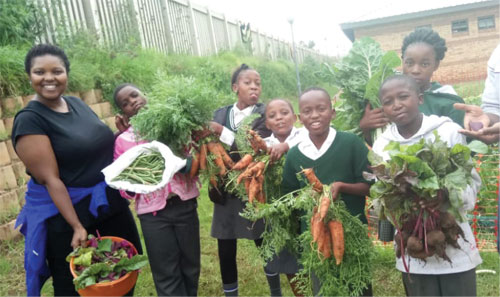
“The vision of the programme is to reach most of the urban communities in South Africa and Africa at large. We aim to target hotspots of unemployment, poverty and hunger in cities and small towns,” she says.
According to Mkwanazi, investments in nutrition and education are essential to break the cycle of poverty and malnutrition.
Mkwanazi started her business in her grandmother’s backyard with nothing but the seeds that her mother gave her. Today she operates from land in Limpopo that was purchased by her family and space she leases in Benoni.
“From the research I did, I was able to determine what to plant and how to prepare the land for my plants to grow. I then formulated a business plan and got myself an industry expert, Siphiwe Sithole of African Marmalade, to mentor me,” she says.
Because of the value that mentorship added to her business, Mkwanazi understands the importance of transferring knowledge and skills.
“We have implemented the Ayanda Organic Gardens programme in one school. Unfortunately, our plans to expand into other schools were suspended due to the Coronavirus pandemic, but we are working on restarting the programme in schools,” she adds.
The programme has also reached six families, with an average of four to five people in a single family, totalling a reach of roughly 30 people.
Her business has so far created three permanent jobs and six seasonal ones at both farms. The fresh produce – including amarantha (imbuya/thepe), cowpeas (tinhlumayo/izindumba), indigenous pumpkin, sorghum, inkakha and ibeche – is sold to locals.
“I have received support in the form of business development from the National Youth Development Agency and the Small Enterprise Development Agency,” she says.
Mkwanazi is a qualified project manager and a LLB candidate at UNISA.
Contact her via email at info@nanloyorganic.co.za or nandi@nanloyorganic.co.za, Facebook at @NanloyOrganicFarm or call 081 277 0900.
Young women bridge gender gap
Young women bridge gender gap tsoanaTwo young civil engineers are tackling gender inequality in the engineering sector head-on.
Vanderbijlpark-based Jam Fadge Civil Engineers, owned by Makgotso Motsumi (27) and Thando Sikwatsha (29), primarily hires young women who recently graduated in construction or civil engineering and students needing hands-on experience.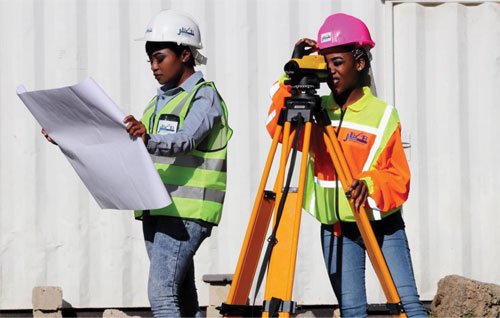
Sikwatsha says this is done deliberately to enable young women to gain experience in what is still largely a male-dominated sector. “We are about giving young women opportunities to succeed.”
The company would like to see the sector becoming more innovative and hopes that by empowering young women civil engineers, they can promote new thinking, green building, a diverse approach in the way construction projects are being handled and new technologies.
Six women are currently employed by Jam Fadge, three of whom are students getting on-the-job training. Sikwatsha says: “Students who are studying engineering need experiential training and we give them that. Those who have graduated often don’t have enough experience and our aim is to train them and equip them with the best skills for the industry.”
As part of its mission to train young engineers, the company has started the Jam Fadge Civil Engineers Career Path Programme. Institutions of higher learning are visited by members of the Jam Fadge team to offer mentorship, advice on choosing the right career path and assist students to choose the right civil engineering field.
“We recognise that the civil engineering industry consists of so many streams and fields, and that each student deserves the opportunity to find their sweet spot,” she says, adding that if students find the career path that best suits their abilities, they are more likely to do well at work. This, in turn, will help fill the skills gap with dedicated professionals.
Jam Fadge Civil Engineers offers construction and renovation work, structural engineering design, general works and civil, mechanical and electrical engineering services.
The company works with municipalities, private companies, NGOs and individuals, among others, and has registered to operate in Lesotho and the Democratic Republic of Congo. Its biggest project since launching in 2016 is the Zamdela Municipality sewer project.